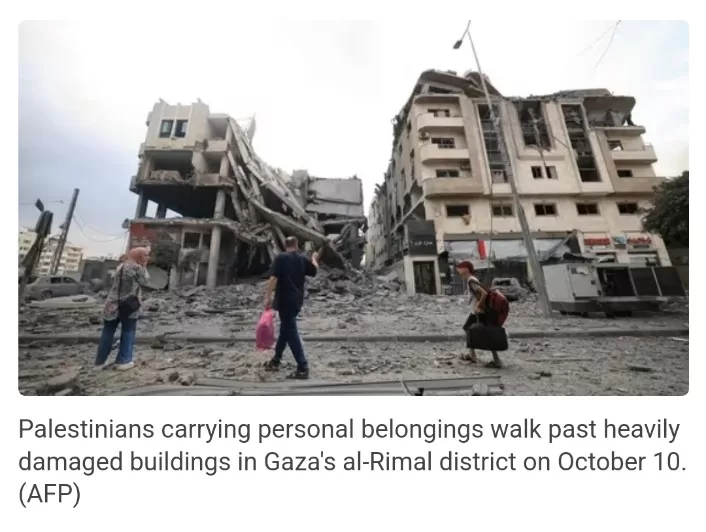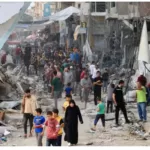A significant Israeli military buildup persists along the border of Gaza, accompanied by the confirmation from the nation’s military that the death toll from Saturday’s unprecedented Hamas attack has surpassed 1,000, marking it as the deadliest militant assault in Israeli history. Speculation is rife about the imminent launch of a ground invasion into Gaza, and Israeli soldiers continue to retrieve the bodies of the deceased four days after Hamas conducted a devastating rampage through southern Israeli towns.
The Israeli military asserted that it had largely secured its border with Gaza after a night of intensified airstrikes that inflicted damage to infrastructure and resulted in the displacement of thousands of individuals. The Gaza health authority has reported a death toll of 900 since Saturday within the enclave.
Reflecting the rapidly escalating crisis, a barrage of rockets was fired from southern Lebanon, under the control of Hezbollah, into northern Israel. This marked the third consecutive day of violence along the Lebanese-Israeli border, prompting Israeli forces to respond with retaliatory fire. Additionally, the Israeli military shelled Syria from the Golan Heights following mortar rounds fired into the territory, and two Palestinians were fatally shot by police in East Jerusalem.
Evidence of the gravity of Saturday’s events continues to surface, particularly in the southern kibbutz of Be’eri, where over 100 bodies have been recovered, constituting approximately 10% of the community’s population.
In Kfar Aza kibbutz, the streets were strewn with bodies of both Israeli residents and Hamas militants, alongside charred cars and scattered furniture. Israeli soldiers meticulously navigated through the homes to remove the deceased.
Major General Itai Veruv, escorting journalists through the scene, poignantly remarked, “You see the babies, the mothers, the fathers, in their bedrooms… It’s not a war, it’s not a battlefield. It’s a massacre.” He drew a haunting parallel to historical atrocities in Europe, stating, “It’s something that we used to imagine from our grandfathers, grandmothers in the pogrom in Europe and other places.”
In Washington, President Joe Biden condemned Hamas, characterizing its attack as an “act of sheer evil” and expressing his profound dismay at reports of torture inflicted on innocent civilians. He affirmed unwavering support for Israel, emphasizing that “the United States has Israel’s back.”
As Israeli tanks and military vehicles congregate around Gaza, hundreds of thousands of reservists are mobilizing to join their units. A spokesperson for the Israeli military declared that forces are erecting “an iron wall” along the border of the besieged coastal enclave.
This substantial mobilization strongly suggests that Israel is preparing for a more extensive military offensive against Hamas in Gaza, surpassing the scale of previous confrontations, which resulted in the loss of thousands of Palestinian lives.
Amid this turmoil, concerns about the safety and lives of approximately 150 hostages held by militants in Gaza have emerged. Hamas has threatened to execute these captives if Israel proceeds with airstrikes without prior warning.
UN agencies have issued warnings about an impending humanitarian catastrophe in Gaza, home to 2.3 million people. Hospitals, overwhelmed with casualties, are rapidly depleting their supplies, including food, fuel, and medicines, as Israel has imposed a blockade on these essential items.
The World Health Organization has documented 11 attacks on healthcare facilities, ambulances, and medical personnel within the first 36 hours of the new conflict in Gaza, underscoring the urgent need for a humanitarian corridor to facilitate patient referrals and the movement of humanitarian personnel and vital medical supplies.
Furthermore, more than 187,000 people have been displaced across the Gaza Strip, and Gaza’s sole border crossing with Egypt has been targeted by Israeli airstrikes, exacerbating the dire situation.
The growing conflict on Israel’s borders has raised concerns about the potential for its extension. Egyptian President Abdel Fatah al-Sisi characterized the escalation as “very serious” and warned of repercussions on regional “security and stability.” Egypt has intensified its efforts to broker a ceasefire, emphasizing the necessity of de-escalation.
Amid the escalating turmoil, President Sisi reaffirmed Egypt’s stance on achieving a “just and comprehensive peace” based on a two-state solution.




